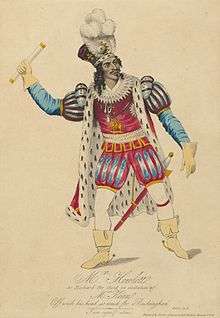James Hewlett

James Hewlett (fl. 1821-1839) was an African-American actor. He was principal actor in and co-creator of William Alexander Brown's African Grove theatre in New York City.[1][2][3][4]
Hewlett started performing as a vocalist and as an actor described as "Shakespeare's proud Representative" in African Grove when it was just an exhibition held in Brown’s tea garden.[5] He is most known for starring in African Grove's performance of Richard III.[6] After the closure of the theatre, he began to tour performing excerpts from plays; historian Shane White suggests that he may have been "the best-known black New Yorker" around 1831.[7] He also visited the United Kingdom and apparently performed in Liverpool, although documentary evidence of this is limited.[8] His career seems to have entered into a decline by and after 1834, when he was imprisoned for larceny. He is reported to have died around 1849.[8]
George Thompson, who has researched the history of the theatre, concluded that Hewlett was a tailor and may have been an emigrant from the West Indies.[9]
References
- ↑ "The African Grove Theater begins | African American Registry". www.aaregistry.org. Retrieved 2016-09-20.
- ↑ George Thompson (1998). A Documentary History of the African Theatre. Northwestern University Press. pp. 53–60. ISBN 978-0-8101-1461-6.
- ↑ Kwando Mbiassi Kinshasa (2006). African American Chronology: Chronologies of the American Mosaic. Greenwood Publishing Group. p. 26. ISBN 978-0-313-33797-0.
- ↑ Jessie Carney Smith; Lean'tin Bracks; Linda T Wynn (1 June 2015). The Complete Encyclopedia of African American History. Visible Ink Press. p. 197. ISBN 978-1-57859-583-9.
- ↑ Dewberry, Jonathan (1982-01-01). "The African Grove Theatre and Company". Black American Literature Forum. 16 (4): 128–131. doi:10.2307/2904218. JSTOR 2904218.
- ↑ "Alexander Street Press Authorization". solomon.bld2.alexanderstreet.com. Retrieved 2016-09-20.
- ↑ David Worrall (30 September 2015). Harlequin Empire: Race, Ethnicity and the Drama of the Popular Enlightenment. Routledge. p. 57. ISBN 978-1-317-31549-0.
- 1 2 Bernth Lindfors (2011). Ira Aldridge. University Rochester Press. pp. 47–55, 304. ISBN 978-1-58046-381-2.
- ↑ George Thompson (1998). A Documentary History of the African Theatre. Northwestern University Press. pp. 3–12. ISBN 978-0-8101-1461-6.